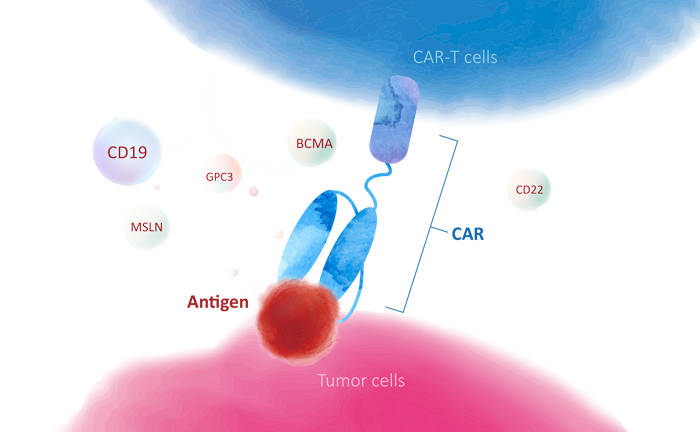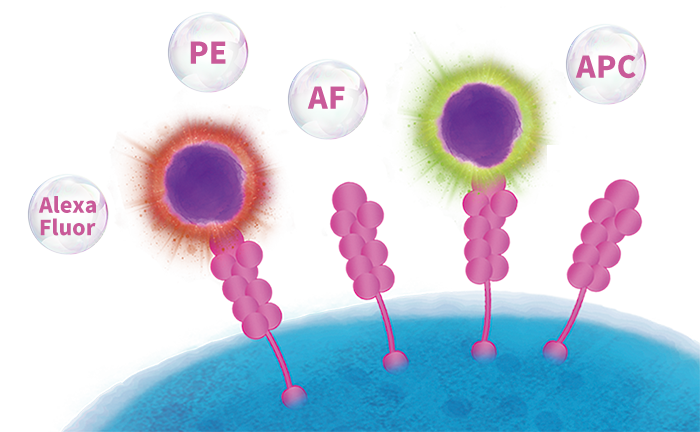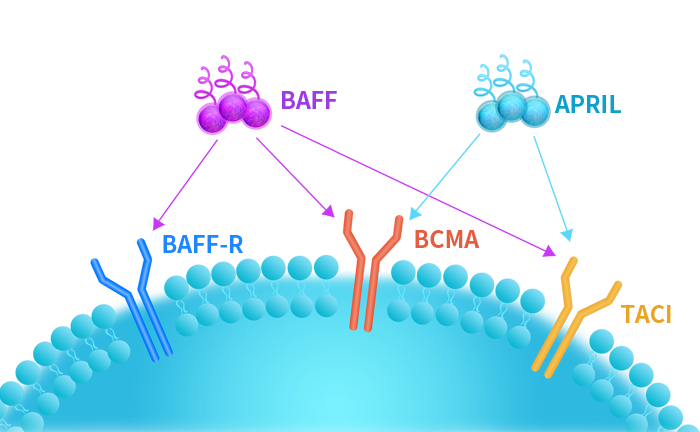
Leave message
Can’t find what you’re looking for?
Fill out this form to inquire about our custom protein services!
Inquire about our Custom Services >>


































 Limited Edition Golden Llama is here! Check out how you can get one.
Limited Edition Golden Llama is here! Check out how you can get one.  Limited Edition Golden Llama is here! Check out how you can get one.
Limited Edition Golden Llama is here! Check out how you can get one.
 Offering SPR-BLI Services - Proteins provided for free!
Offering SPR-BLI Services - Proteins provided for free! Get your ComboX free sample to test now!
Get your ComboX free sample to test now!
 Time Limited Offer: Welcome Gift for New Customers !
Time Limited Offer: Welcome Gift for New Customers !  Shipping Price Reduction for EU Regions
Shipping Price Reduction for EU Regions
> CD19: un objetivo terapéutico validado para las neoplasias de células B

La CD19 es una proteína de superficie de las células B que se expresa a lo largo del desarrollo de las células B y se expresa en casi todas las neoplasias de células B, como la leucemia linfocítica crónica (LLC), la LLA y muchos linfomas no Hodgkin. Esta especificidad y la expresión universal para un único linaje celular han convertido a la CD19 en un atractivo objetivo para la terapia basada en anticuerpos, incluyendo anticuerpos biespecíficos, ADCs, anticuerpos de ingeniería Fc y terapia de células CAR-T. Hasta ahora, la FDA ha aprobado dos terapias con células CAR-T anti-CD19 y un anticuerpo biespecífico anti-CD19/CD3 para tratar las neoplasias hematológicas de células B. Hasta el 7 de mayo de 2020, según ClinicalTrials.gov, se han iniciado más de 763 ensayos clínicos.
Para apoyar el desarrollo de la terapia basada en anticuerpos dirigidos a CD19, ACROBiosystems ha desarrollado una serie completa de productos de proteína CD19, incluyendo CD19 no conjugada, CD19 biotinilada y CD19 marcada con fluorescencia. Estas proteínas son adecuadas para la inmunización, el cribado de anticuerpos, la medición de la afinidad de los anticuerpos y la detección de la expresión de CAR anti-CD19. La alta actividad de estas proteínas se ha verificado mediante ELISA, SPR y citometría de flujo (FACS). Los protocolos se ofrecen de forma gratuita, lo que puede ayudarle a ahorrar el ciclo de desarrollo.
ACROBiosystems ha presentado el DMF para su CD19 recombinante a la FDA, y presentó el número de DMF como 034936. Si nuestras proteínas CD19 archivadas en la DMF se han utilizado en su proceso de desarrollo de fármacos, puede solicitar que proporcionemos la autorización de la DMF a la FDA en apoyo de una presentación o solicitud que haya hecho a la FDA. Por favor, envíe su solicitud a ACROBiosystems dejando sus datos aquí.Solicitud de autorización
| Molécula | Cat. No. | Anfitrión | Descripción del producto | Estructura |
|---|

5e5 of anti-CD19 CAR-293 cells were stained with 100 μL of 1:50 dilution (2 μL stock solution in 100 μL FACS buffer) of PE-Labeled Human CD19 (20-291), His Tag (Cat. No. CD9-HP2H5) and negative control protein respectively (Fig. C and B), and non-transfected 293 cells were used as a control (Fig. A). PE signal was used to evaluate the binding activity (QC tested).
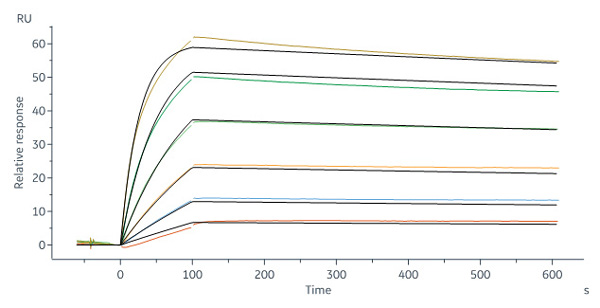
Biotinylated Human CD19 (20-291), His, Avitag (Cat. No. CD9-H82E9) captured on Biotin CAP - Series S sensor Chip can bind FMC63 MAb (mouse lgG2a) with an affinity constant of 0.255 nM as determined in a SPR assay (Biacore 8K) (QC tested).
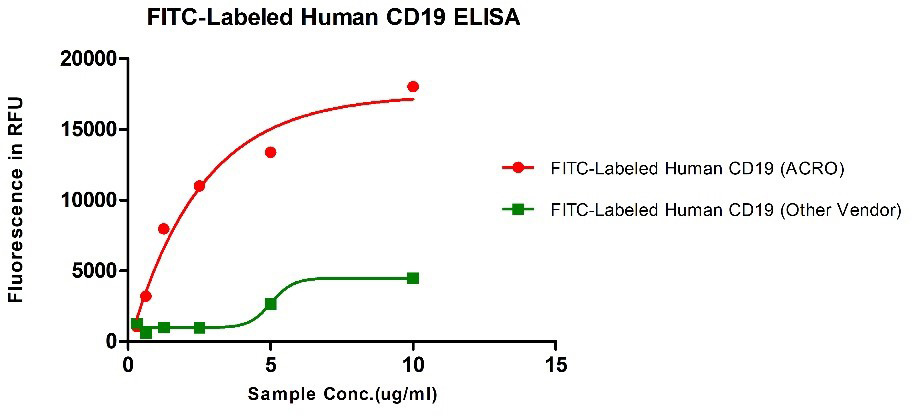
Binding activity of FITC-Labeled Human CD19, His Tag from two different vendors were evaluated in the ELISA analysis against FMC63 Mab. The result showed that ACRO's FITC-Labeled Human CD19, His Tag has a much higher binding activity than that of the other vendor.
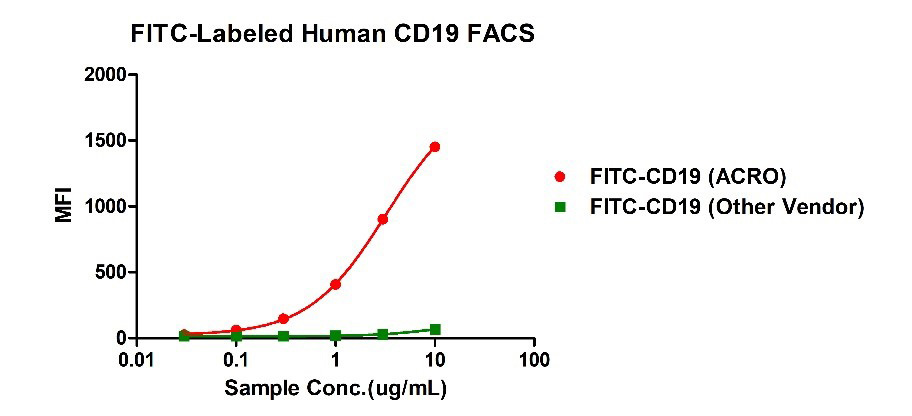
Binding activity of FITC-Labeled Human CD19, His Tag from two different vendors were evaluated in the flow cytometry analysis against anti-CD19-CAR-293 cells. The result showed that ACRO's FITC-Labeled Human CD19, His Tag has a much higher binding activity than that of the other vendor.

Binding activity of Human CD19, His Tag from two different vendors were evaluated by SPR assay against FMC63 MAb. The result showed that ACRO's Human CD19, His Tag can bind FMC63 MAb with an affinity constant of 2.95 nM which is much higher than that of the other vendor.
This web search service is supported by Google Inc.








